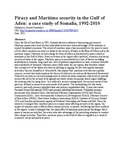| dc.description.abstract | Since the fall of Siad Barre in 1991, Somalia has been without a functioning government. Maritime pirates and a host of other individual actors have taken advantage of the situation to exploit the global commons. The extent of maritime piracy has increased over the years to reach a level where maritime security is a threat to the security of states in the Hom of Africa and in the maritime region. Maritime security along the Hom of Africa is threatened by piracy which is dominant in the Gulf of Aden. Piracy activities in the region affect political, economic and social security of states in the region. Maritime piracy is exacerbated by a host of factors including lawlessness in Somalia, long coast line, lack of political organization on land, economic benefits and availability of weapons.
Maritime piracy falls under the jus cogens, this therefore means that, irrespective of the status of a state in ratifying or signing the law that regards maritime activities, they are bound by it. Henceforth, this implies that, maritime activities are a global concern; as such this study employs the theory of collective security as its theoretical framework. Collective security is a security arrangement in which all states cooperate collectively to provide security for all by the actions of all against any states within the groups which might challenge the existing order by using force. In a collective security arrangement, the security needs of one party are defined in terms of security needs of all parties.
The methodology for this study research uses both primary published data and primary unpublished data. It uses interviews, Focused Group Discussions (FGD) and primary published documents. Published primary documents were obtained from, International Maritime Organization (IOM) East African Community (EAC) , Inter Governmental Authority on Development (IGAD), Maritime Society of East Africa (MSEA), East Africa Seafarers Association (EASA) Institute of Security Studies (ISS) and Somalia autonomous regions of Puntland, Galmudug and Himan and Heb. From the research it emerged that, maritime piracy is a major issue affecting security in the region, the impact of maritime piracy affects states internal security, economic well being and fuels conflicts in the region. In sum it emerged that, the main effect of maritime piracy is not the danger that it poses to marine security but, the actors who take advantage of the prevailing situation to conduct other illegal activities. Therefore, maritime piracy in the Gulf of Aden is engulfed in a cloud of economic, social and political proxy. | en_US |

